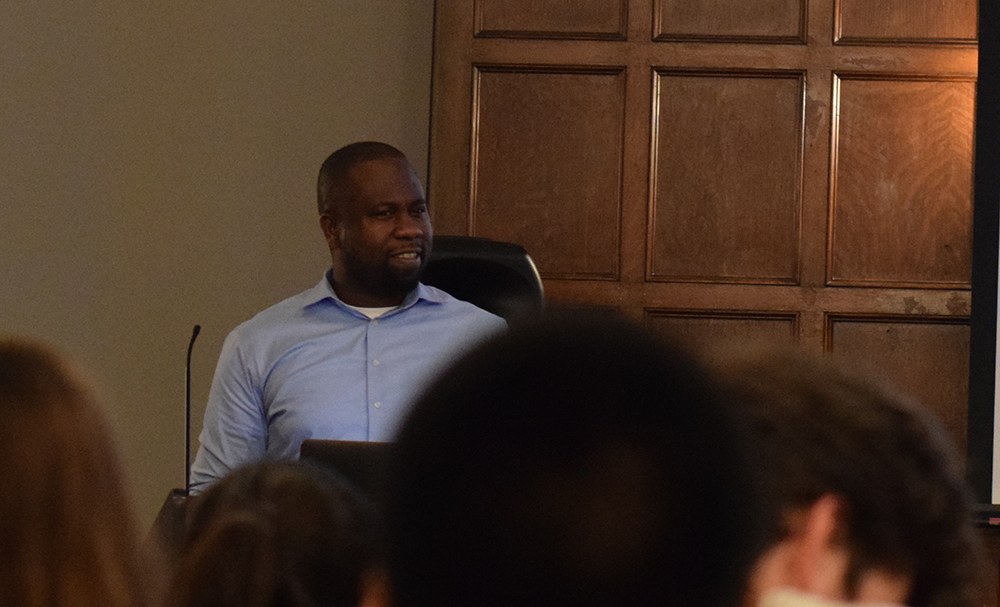Activists need to center intersectionality when advocating for those who are HIV positive, Charles Stephens, founder of the Counter Narrative Project, said in an event Sept. 8.

The Counter Narrative Project, in solidarity with other social and racial justice movements, seeks to empower and amplify the voices of black gay men, according to its website. The organization aims to highlight their stories while encouraging voter registration, reducing crystal meth usage, improving HIV prevention medication accessibility, offering peer coaching and promoting the arts.
Although the Counter Narrative Project’s work is centered on the lives of black gay men, HIV advocacy connects this group to other individuals fighting the virus as well, according to Stephens.
“To talk about HIV is to talk about intersectionality because we see an interplay of race and class and gender identity and sexual identity and economic distress,” Stephens said. “Just so many forces and factors contributing to one’s social vulnerability but also as a space of joy, as a space of finding ways to be resilient collectively.”
The disability studies program hosted the event entitled “We Are Here: Anti-Black Racism, HIV Justice, and Future of Our Movement” in Copley Formal Lounge on Sunday. Stephens shared a series of videos featuring prominent HIV activists and encouraged an active dialogue with the audience throughout his presentation.
Sharing stories of black gay men living with HIV is a cornerstone of the Counter Narrative Project because it has the capacity to shape public policy and impact hearts and minds, according to Stephens.
“One of the things that I have been passionate about for my entire activist life really has been just wanting to use collective memory as a way to respond to injustice, wanting to take the stories of the movements I’m a part of, taking those stories and presenting them as evidence of our community resilience and resistance,” Stephens said.
Stephens highlighted HIV activist Robert Suttle’s narrative throughout the event. Suttle was incarcerated in Louisiana for six months in 2010 after he was accused of failing to disclose his HIV positive status before a sexual encounter, according to the website of his advocacy organization, The Sero Project.
Suttle’s story and prosecution under Louisiana’s “Intentional Exposure to AIDS Virus” statute prompts broader conversations surrounding laws that criminalize those with HIV, according to Stephens. The statute is similar to laws in 19 states that require people with HIV to disclose their positive status to sexual partners, according to a 2018 Center for Disease Control study.
Other laws criminalize people with HIV for “low or negligible risk behavior” like biting or spitting. Such legislation needs to be updated to better reflect the scientific realities of HIV, according to Stephens.
“Many public health associations and professionals have come out and said these laws are bad for public health and I think the question that we ask ourselves is: ‘What is optimal for public health and what is not optimal?’” Stephens said. “These laws are just not seen as optimal. They are seen as very harmful.”
HIV criminalization expands beyond the traditional incarceration as those with HIV also have to face the court of public opinion, according to Stephens.
“Criminalization isn’t just about putting people behind bars — which it is — but it is an entire system. People are criminalized in the media,” Stephens said. “Often times when people are charged and it makes its way to certain media outlets, they are convicted and tried by the media and you will see this horribly stigmatizing information before they even go before a judge.”
Throughout the presentation, Stephens shared quotes from famous advocates who influenced the Counter Narrative Project, including writer Joseph Beam and poet Essex Hemphill. However, lesser known activists’ stories also inspire the organization’s work, according to Stephens.
“There may not ever be books written about them. There may never be major movies about their lives but we hold their work in our hearts, in our work, in the DNA of our organization,” Stephens said. “When I think about what is means to resist anti-blackness in the HIV movement, I think about mainly them.”




















